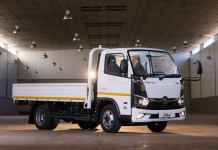The new Doosan LPM15N-7 lithium-ion powered pallet truck launched locally by Goscor Lift Truck Company closes a crucial product gap in the leading materials handling equipment supplier’s offering. With a maximum capacity of 1,5-tonne, the new pallet truck is ideally suited to retail and e-commerce environments.
While GLTC has always offered lithium-ion powered pallet trucks through its Crown offering, Sales Director Patrick Barber explains that the company has never offered a mid-tier product range, from a price point perspective. The first units arrived in the country in mid-September and have been already delivered to use at several leading retailers.
“Crown manufactures a high-end product that is designed for high-productivity environments where continuous use for 8-10 hours is required,” explains Barber. “The new Doosan LPM15N-7 pallet truck fits well into the mid-tier segment where low to medium utilisation of the product is the order of the day.”
With a 1,500 kg lift capacity, the truck offers high performance on a compact chassis similar to a standard hand pallet truck; making it ideal for the retail and e-commerce environments. The truck features a plug-and-play lithium-ion cartridge battery which provides up to four hours operating time on a full charge and quick and easy replacement for use in longer operational cycles. The battery can be fully recharged in two hours. Opportunity charging is supported, and the battery capacity is not affected by frequent charging.
GLTC is especially targeting the retail market, where hand pallet trucks have traditionally been used. “We have never really been involved in the back-end of the store. When we have, it has always been with the manual solution. The new Doosan LPM15N-7 pallet truck thus gives us access to a whole new customer segment. This allows us to complete the whole supply chain, all the way from unloading containers to the warehouse and now the retail store. We can now complete the whole cycle,” says Barber.
The new unit offers an array of benefits to the retail sector compared with the traditional hand pallet trucks. Firstly, it comes at the right price point. The launch price is just under R50,000. There is also a rental option available with a maintenance contract. Subject to terms and conditions, says Barber, the rental option is around R1,800 per month, including maintenance.
“There is a huge difference in terms of the capital price of the manual hand pallet truck versus this lithium-ion powered pallet truck. The new unit allows operations to redeploy some of their manual operators to other areas of their business, while upskilling those tasked with operating this unit,” he says.
Secondly, the lithium-ion powered pallet truck offers greater productivity than the hand pallet truck. The major emphasis is to improve productivity on the back-end of the retail store compared with manual type of operations normally employed in these facilities at a reasonable price point.
“In about six months, we will be able to do a cost of ownership modelling to indicate the increase in productivity, the reduction in staff member requirements and the payback period. My assumption is that a truck of this nature would be able to pay for itself in 6-12 months,” says Barber.
Barber says a motorised solution is also a lot safer and user-friendly than the manual counterpart. The truck features an ergonomically designed handle for operator comfort with conveniently placed lift, lower and emergency safety switch. It also features a control override button, which allows the operator to move the truck while its tiller arm is upright.
Compared with lead-acid battery counterparts, Barber reasons that lithium-ion allows for high utilisation with its high charge rate. It also eliminates the need for multiple batteries in specific operations, which also negates the need for battery bays.
Over the long term, in the right environment, lithium-ion offers greater return on investment. “However, a like-for-like lithium-ion versus multi-battery solution is not always viable. It is very much dependent on the operation – how the operation physically works on a daily basis, where trucks are being used, when are they used and what intervals, among other factors,” says Barber.
With all these factors considered, GLTC offers a bespoke solution that speaks directly to the needs of the particular site. “We then build a bespoke lithium-ion solution for the truck at hand. With that approach, the offering becomes a more cost-effective ownership type of solution than just a technology solution,” concludes Barber.















